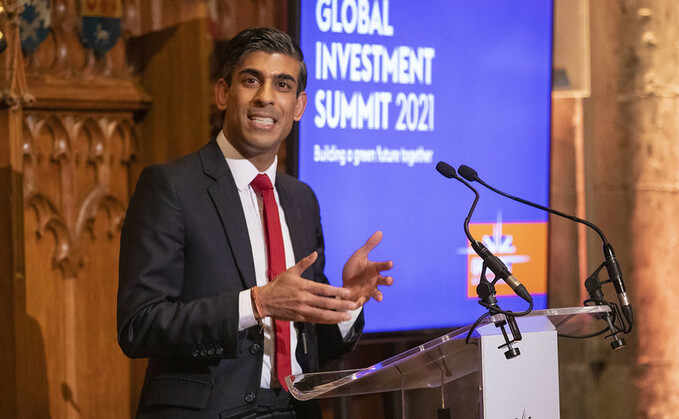
Credit: HM Treasury
Chancellor Rishi Sunak is set to out plans to establish the UK as "the world's first net zero aligned financial centre", while welcoming new data that indicates financial firms with $130trn of assets have now set emissions goals in line with the Paris Agreement.
The third full day of the COP26 Climate Summit has been designated as "Finance Day" and is expected to see a flurry of fresh climate commitments from governments and financial institutions designed to accelerate the net zero transition.
Sunak is scheduled to convene "the largest ever meeting of finance leaders on climate change", where he will unveil a series of fresh proposals to help cement the UK's position as a green finance hub.
Specifically, he is expected to provide an update on the government's plans to require UK financial institutions and listed companies to publish net zero transition plans that detail how they will adapt and decarbonise as the UK moves towards to a net zero economy by 2050.
Moreover, in a bid to guard against greenwashing he will reveal new propoals for a science-based 'gold standard' for corporate and financier transition plans to be drawn up by an independent Transition Plan Taskforce, composed of industry and academic leaders, regulators, and civil society groups.
Meanwhile, an update on the progress of the Glasgow Financial Alliance for Net Zero (GFANZ) will reveal that over 450 firms have now committed to delivering net zero emission portfolios, which together hold over $130tr in assets, equivalent to around 40 per cent of the world's financial assets.
In addition, the UK is expected to seek to address barriers to finance faced by developing countries with a series of new green initiatives funded from its international climate finance (ICF) commitment, including £100m to respond to recommendations from the UK co-chaired Taskforce on Access to Climate Finance to make it faster and easier for developing countries to access finance for their climate plans.
And in a further advance towards the global goal to mobilise $100bn a year of climate finance for developing economies, the Chancellor is expected to announce the launch of a new financing mechanism - dubbed the Climate Investment Funds' Capital Markets Mechanism (CCMM) - that aims to boost investment in clean energy like solar and wind power in developing countries.
The new package comes just a day after the Japanese government announced an extra $2bn a year of finance over five years, prompting US Climate Envoy John Kerry to predict the $100bn a year target could be met by 2022, rather than 2023 as was projected last week. Similarly, yesterday saw the launch of new plans for a $8bn climate finance package for South Africa and a series of new initiatives to tackle deforestation in developing economies.
However, many developing countries remain furious at the failure to meet the original target to deliver $100bn a year of climate finance by 2020, with several leaders from emerging economies this week publicly criticising their counterparts from industrialised nations over the "breach of trust" that has resulted from falling short of the goal.
The flurry of fresh financial pledges are likely to be welcomed by business groups and the growing number of financial firms that have set net zero targets.
Dr Ben Caldecott, director of the UK Centre for Greening Finance and Investment (CGFI) which has been appointed to act as the secretariat, together with think tank E3G, for the new Transition Plan Taskforce, welcomed the new commitments from the UK government.
"The world's largest international financial centre will become the world's first net zero-aligned financial centre," he said. "This is underpinned by world-leading regulation and the economy-wide adoption of net zero transition plans. This will spur demand for green finance and accelerate decarbonisation, not just in the UK but wherever UK firms do business. This will make a real difference and means the UK financial services sector will play an even larger role in providing the capital and financial services required to deliver net zero globally."
Ed Matthew, campaigns director at E3G, similarly welcomed the move, arguing that "mandatory net-zero transition plans are a key pillar in the financial architecture needed to mobilise the trillions required to get on track to net-zero and achieve a green economic recovery".
However, some green groups will inevitably give the wider plans only a cautious welcome, having long argued that financial firms committing to achieve net zero emissions need to do more to accelerate their decarbonisation efforts if they are to deliver on the goals of the Paris Agreement.
A major new report from the Reclaim Finance campaign group yesterday offered a damning critique of the financial sectors various net zero initiatives, warning that many of the firms that have made net zero pledges are continuing to invest in new fossil fuel infrastructure.
Similarly, Sunak's appearance at COP26 comes just days after he was slammed by environmental groups over last week's Budget, in which he cut Air Passenger Duty on domestic flights and only briefly mentioned the UK's net zero plans.












